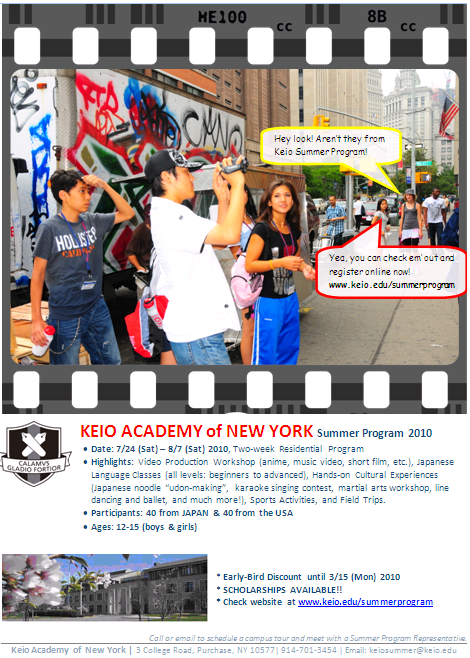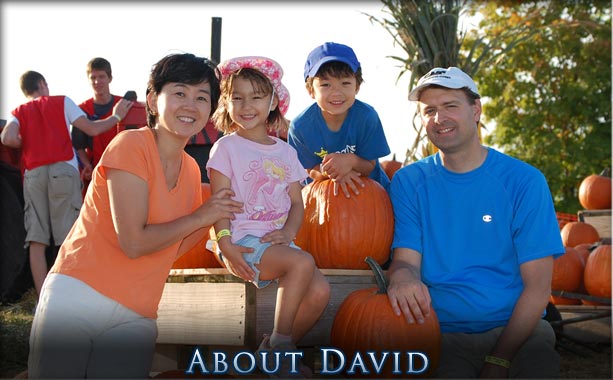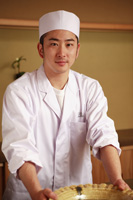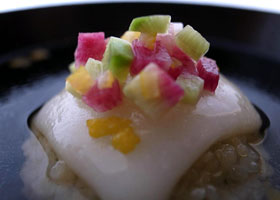Job: Copywriting & Bloggers for Japanese tech blog
Want to write for a Japanese electronics/gadgets retailer? Read on for some freelancing opportunities:
We at CScout Japan are currently looking to recruit some new copywriters for one of our clients, an online retailer based in Japan. This is a great opportunity to hone your copywriting skills editing content in several areas.
Job 1
Japan Trend Shop sells select Japanese gadgets, cool designer accessories, wacky toys and more to customers all around the world. Your job would be to write copy that accurately describes products in an exciting way. Sometimes these products might be hard to understand for non-Japanese audiences, so part of your job would be using words to traverse those cultural gaps. You would also be preparing images and video links to accompany the text.Job 2
As above you would be writing copy for products, but this time for Kanojo Toys, a specialist adult online store. We are also looking for people who can write for the shop’s blog, in which you will report on the seedy Tokyo underworld, covering unique stories, idol news, and JAV gossip.Who
We want you if you are based in Japan (preferably Tokyo) and are enthusiastic about Japanese products. You may be a geek, a design fan or just adore hi-tech gadgets. Whatever you are into, you will love writing about it. You are a web-savvy person who likes blogging and image editing. As you will be researching in Japanese, your language skills should also be good.Requirements
You need to have a valid working visa and be based in Tokyo (or least Japan). Equally important, though, is having a good ear (and eye) for how to sell cool Japanese stuff to an overseas market.Payment
You’re not going to get rich, but payment will be per piece. Strong experience and skills will be rewarded with higher reimbursement. Further, there may be opportunities to expand into working with us in other projects from research to marketing.Apply
Please email your information to contact (at) cscoutjapan.com, with “Copywriter application” in the subject line. We look forward to hearing from you!
WIT Life #83: Japan in the news and in film
WITLife is a periodic series written by professional Writer/Interpreter/Translator Stacy Smith (Kumamoto-ken CIR, 2000-03). She starts her day by watching Fujisankei’s newscast in Japanese, and here she shares some of the interesting tidbits and trends together with her own observations.
The Wall Street Journal had some interesting Japan coverage this week. One article from earlier in the week discusses tactics being employed to get the Japanese populace turned on to fish again, as its popularity has declined due to factors such as smell, price and preparation. It has gotten to the point where fishery officials have started sending instructors to schools in order to teach children how to eat fish with chopsticks, and fish is being promoted in pop culture by characters such as Sakana-kun (on right saying “Let’s eat delicious fish with Sakana-kun!”).
Another article focuses on Japanese-Americans who were interned during WWII, and how they got through this ordeal by forming swing bands. This legacy is being preserved through a tribute band called Minidoka Swing Band, with members who were internees as well as others who have no ties to the camps (check out the video, they’re talented!).
Speaking of the internment, this weekend was the 3rd annual New York Peace Film Festival which featured Read More
Tom Baker reviews “Cirque du Freak” manga
Tom Baker (Chiba-ken, 1989-91) is a staff writer for The Daily Yomiuri. He usually writes for DYWeekend, the paper’s arts and leisure section. You can follow Tom’s blog at tokyotombaker.wordpress.com.
He recently reviewed manga series “Cirque du Freak” by manga artist Takahiro Arai, comparing it to the series of novels on which it is based, and also commenting on the recent Hollywood movie version, which opened in Japan this month. Here is an excerpt:
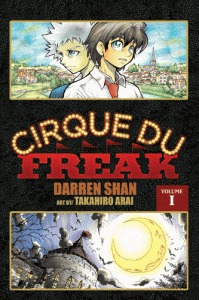 Mangaka Takahiro Arai probably doesn’t look like a frog in real life, but he draws himself as one in the autobiographical bonus pages at the end of each volume of his manga series Cirque du Freak.
Mangaka Takahiro Arai probably doesn’t look like a frog in real life, but he draws himself as one in the autobiographical bonus pages at the end of each volume of his manga series Cirque du Freak.
The manga is based on a series of kids novels by Darren Shan (the pen name of Irish author Darren O’Shaughnessy), and the poor little frog is shown sweating bullets at the thought of adapting the popular works–especially at such length. “I had only drawn self-contained short stories before this,” the Arai-frog confesses.
The material he had to work with is the story of a boy, also named Darren Shan, who gets mixed up with a traveling freak show that includes a vampire named Mr. Crepsley. Darren is basically a good kid, but he engages in a bit of juvenile delinquency that includes stealing the vampire’s pet spider–a life-changing mistake. It leads to his indenture as the vampire’s assistant, a position that takes some getting used to.
Reading the manga also takes some getting used to, as the big-eyed cuteness of the characters, and the silliness of Mr. Crepsley’s stage outfit, which makes him look like a cross between a flamboyant X-Man and the Cat in the Hat, initially neutralize the story’s darker elements.
Darren has to become a “half-vampire” to work with Mr. Crepsley, an arrangement he agrees to only to get the vampire’s help in saving the life of a friend whom Darren has accidentally allowed the venomous stolen spider to bite.
In the first novel of Shan’s series, the scene in which Darren is transformed by Mr. Crepsley is slowly drawn out. The reader has plenty of time to reflect that a strange man coercing a barely adolescent boy into exchanging bodily fluids and then running away from home is seriously creepy on more than one level. But the same scene is quick and perfunctory in the manga.
Fortunately, Arai more than hits his stride as the series continues.
Some of Shan’s humor is very black, such as in a scene when a misguided animal-rights activist named R.V. lets a wolf-man out of its cage and is dismembered for his efforts. Arai’s pacing here is much improved: He builds tension over several pages as Darren tries to stop R.V., and then lets the reader turn one more page to see the scene suddenly climax in a spectacular eruption of gore.
But later the escaped beast kills one of Darren’s friends, an event that the book and the manga treat as not funny at all. Here those big eyes that Arai has been drawing finally find their purpose, brimming over with tears in a scene that really is touching.
Arai shows the monster grabbing his victim by the ankle in a frame that visually echoes an earlier one in which the doomed boy had grabbed Darren in the very same way as part of a practical joke.
And as Darren loses consciousness, exhausted by his failed fight to save his friend, we see his view of the world fade out in a series of tilted frames that get smaller and darker as they literally tumble off the bottom of the page, in a highly effective example of the frame-manipulating techniques that Osamu Tezuka was also known for.
Many scenes, such as Darren’s first date with a girl, are made more believable by Arai’s well-drawn facial expressions than by Shan’s bare-bones prose.
Read the rest of the article here.
Doing Business with China / Asian Networking (03/29)
Jon Hills runs JETAANY’s Nihongo Dake Dinner. It’s one of the few regular Japanese events in New York City designed to bring both Japanese and non-native Japanese speakers together. He’s also the founder of Hills Learning (http://www.hillslearning.com), a language school based in Grand Central, New York City, that runs Asian Networking Events monthly.
On March 29 2010, Hills Learning will host an Asian Networking Event called “Doing Business with China.” This is to promote the exchange between people who are interested in Asian languages and cultures. Hills Learning is a language school that teaches Japanese, Chinese, Korean, and English.
To RSVP, please send an email to events@hillslearning.com. For more information, please visit Doing Business with China
The guest speaker is the CEO of US China Partners, a company that has advised Fortune 500 companies on entering the Chinese market. His commentary will include the recent experiences with Google and China, and past experiences of what has worked when building US / China strategic partnerships.
Co-sponsor, Two Rivers Associates, was established in 2008 to assist small- and medium-size business owners grow their businesses between Asia and North America. “Two Rivers” represents not only our location, in Manhattan between the East River and Hudson River, but also our client and our staff, the convergence of creative ideas and actions, and the resulting synergy that is generated toward the creation of a better future.
The latest issue of JQ (JETAA NY Quarterly) Magazine has hit the stands, and now Editor Justin Tedaldi (CIR Kobe-shi, 2000-01) working on the next issue and seeking writers. Read on for more info. (It also actually stands on its own as a great list of JET-relevant things and interesting JET alums.)
Hi, Brainstorm Crew!
Hope everyone’s enjoying the start of spring (a link to JQ’s new issue is here in case you haven’t seen it yet).
Thanks always for your contributions and ideas and feel to link the new issue to your own sites/blogs to help promote us.
We are also taking on new writers if you’d like to provide some “local international coverage” of your chapter to appear in our pages. Contact me at magazine@jetaany.org for details.
Some of you have already signed up for stories at our quarterly meeting in February, so the below deadlines are the same (let me know how those stories are coming along). Here are the ideas needing takers for our May/June 2010 issue and beyond. De wa…
Deadlines are as follows:
FRIDAY, APRIL 2: Registering a story assignment with me at magazine@jetaany.org, or pitching an idea of your own for approval. First come, first served, and all suggestions are welcome. We’ve been picking up more new writers with each issue, and I encourage all first-timers whether you consider yourself a seasoned writer or not. (Just mind the deadlines!)
FRIDAY, APRIL 23: Deadline for submitting a final draft of your story. Extensions will be granted on a case-by-case basis, less so for new writers.
I would also greatly appreciate added assistance for the following:
REVIVE THE SOCIETY PAGE!: Are you a superJET who’s up-to-date on what’s happening in the lives of our members here in New York and elsewhere? I’d like to bring back the JETAANY Society Page with your help. I would carry this feature in every issue, to run at least half a page (600 words). E-mail me for more details and we’ll talk.
COPY EDITING/PROOFREADING: For those of you who like reading this thing cover to cover. Multiple times.
AD SALES CALLS: More sales means more JETAANY-sponsored events. It takes under two minutes to get an answer in most cases. Write for more info.
YOUR OWN STORY IDEAS: Anything’s fair game! Some of our most interesting material comes from suggestions from our more dedicated readers.
Now the fun stuff. Below are the story ideas. Thanks for reading and providing your support, and e-mail at magazine@jetaany.org with any other questions/ideas.
Summer Internship Opportunity @ Keio Academy of NY
Internship Announcement (July 21st – August 8, 2010)
Keio Academy of New York, a not-for-profit private co-educational boarding school located in Purchase, New York, will be holding the 3rd annual “English-Japanese Bilingual/Bicultural Residential Summer Program” for students (boys and girls between ages 12- 15). We are anticipating to have 40 students from Japan and 40 American students to join this program. For the details of the program, please visit our website http://www.keio.edu/summerprogram/
We are currently seeking college and graduate student interns for this program.
Keio Academy of New York will provide to all the interns, on-campus housing, free cafeteria privileges and extra meal stipend. The school will also reimburse (up to $500.00) domestic transportation costs.
Please visit our web site for details. Application closes Friday April 2, 2010.
Any questions regarding our summer program should be directed to:
Carleen Ben (Oita JET 2006-2008)
Keio Academy of New York Summer Program 2010 Administrative Office
E-mail: keiosummer@keio.edu
Job: Youth For Understanding seeks Japanese Culture and Language Teachers for two orientation sessions (Berkeley, CA)
Shared with JetWit via JET alum Livy Traczyk:
Youth For Understanding USA (YFU) is one of the world’s oldest, largest, and most respected international exchange organizations. YFU oversees global exchange programs that prepare young people for their responsibilities and opportunities in a changing, interdependent world.
In June of 2010, Youth For Understanding USA will conduct two short orientations for US high school students who will be spending the summer in Japan . We are looking for several qualified candidates to serve as Japanese Culture and Language Teaches at these orientations. The Culture and Language Teachers will teach YFU’s Japanese Culture and language curriculum and assist with non-classroom responsibilities as needed. Culture and Language Teachers play a huge role in helping prepare students for their upcoming study abroad experience in Japan , both culturally and linguistically.
This is a paid contract position that will last from June 5-15 (tentative dates – see job description below). Additionally, YFU will pay for travel expenses to and from the orientation site in Berkley , California , as well as all room and board while on program. The application deadline for this position is Friday, April 2, but hiring decisions will be made on a rolling basis, so applicants are encouraged to apply earlier. To read a position description that includes more information about this position and explains how to apply, visit the following link:
Japan Pre-Departure Orientation Job Description
http://my.yfu.org/dept/eandt/Orientations/JPDO/Teacher%20Position%20Description%20-%202010.pdf (if you have trouble opening this link, please send an e-mail to ltraczyk@yfu.org)
If you have any questions, please contact Livy Traczyk by phone (240-235-2131) or e-mail (ltraczyk@yfu.org).
JET alum David Boling to run for Congress
 Thanks to JET alum Harlan Rosacker of Washington, D.C. for passing along this information:
Thanks to JET alum Harlan Rosacker of Washington, D.C. for passing along this information:
JET alum David Boling has announced his candidacy for the 2nd Congressional seat in Arkansas. You can see David’s website at: www.bolingforcongress.com and you can follow his blog at: www.bolingforcongress.com/blog.html.
Harland adds:
“We have known David since the mid-1990s. Our association grew as a result our having lived in Japan ourselves from 1969 to 1976. Our son Andrew (born in Tokyo) was a JET in Kanagawa-ken from 1996 to 1998.”
Here are a few JET-relevant snippets from David’s bio:
- David Boling, 45, is a fourth-generation Arkansan. He is a 10-year veteran of the U.S. Department of Justice; a one-time lawyer at the Mitchell Williams law firm in Little Rock; and, until last month, the Chief of Staff to Congressman Vic Snyder (D, AR-2).
- Boling is married to former Fuji Television reporter Mine Sasaguri; he and his wife are the parents of two children, Christopher (7) and Ellen (5).
- Fulfilling a desire to learn more about the Japanese educational system, David took a one-year break from law school, 1988-1989, to teach English to students in Fujishiro. He was later selected for a competitive Rotary scholarship which he used to master the 1800 character Japanese language, visit Pine Bluff’s Sister City, Iwai and, most importantly, gain an understanding of the Japanese legal system and trade between Japan and the United States – specifically, about trade between Japan and Arkansas.
- David passed the Arkansas Bar Exam in 1993 and then completed a Masters in Law (LL.M) at Columbia University School of Law in 1994, where he focused on international and Japanese law.
- In 1995, David joined the US Department of Justice Antitrust Division as a lawyer. He worked there for 10 years, spanning both the Clinton and Bush Administrations. As they increasingly litigated cases against Japanese firms, David’s background was a strong asset to the Justice Department, but he also worked to investigate alleged illegal monopoly behavior in the concert ticketing business and on criminal investigations to crack down on international price-fixing cartels, which steal from American consumers. He helped prosecute a Japanese executive and Japanese company for obstruction of justice in two separate antitrust investigations. In 1999, Janet Reno signed an international antitrust agreement between Japan and the US to further open the Japanese market and improve antitrust enforcement that Boling helped to negotiate.
- Boling was selected for a Mike Mansfield Fellowship at Justice, during which he worked in the Japanese Justice Ministry and other government agencies, deepening his understanding of their legal system.
David-san, ganbatte kudasai!
C-DOC: Learn Chinese NYC – The Chinese Pronunciation System (Pin Yin) – Initials
Japanese Classes OnlineThe Chinese Doctor is a recurring feature written by Friend Of JET, Jon Hills, who maintains the blog for Hills Learning (www.hillslearning.com).
Hills Learning is a NY-based language learning services company offering customized and personal Chinese, Japanese, Korean, Thai and Cantonese language learning options. Their listing of classes can be found at: Japanese Classes Online Chinese Classes Online Korean Classes Online Cantonese Classes Online Thai Classes Online
Congratulations on choosing to learn Chinese Pinyin! Whether you’re an advanced or a complete beginner, developing your pinyin skills is essential for any Chinese language learner. Once someone has perfected the pinyin system of sounds, they can basically read and communicate with any Chinese person. The only criteria is that the Chinese person needs to remember their pinyin!
Debunking the Myths about Pinyin A lot of foreigners looking to learn Chinese see the pinyin system as developed for “them.” The Chinese language with its 10,000 characters is just too daunting a task, so there was a romanized system setup for Chinese to make learning it an easier process. While having pinyin definitely makes it easier for English speakers to learn Chinese, actually pinyin is not only just for foreigners. Chinese people learn it too! In early childhood education, pinyin (along with Mandarin instruction) is mandatory in schools throughout China.
Click here for the rest of the article, including other Chinese language and culture articles
Jamie Graves: Food translator and waiter at Kajitsu NYC
 By Steven Horowitz (Aichi-ken, 1992-94)
By Steven Horowitz (Aichi-ken, 1992-94)
Just wanted to share that I had a really terrific dinner the other night at Kajitsu (www.kajitsunyc.com), a new and very unique Japanese restaurant on E. 9th Street in NYC, thanks to professional translator Jamie Graves (Saitama-ken, 2002-03) who not only waits tables in the intimate establishment but also translates the menu and other texts for Kajitsu and interprets for important clients.
Jamie, who specializes in translations relating to food and cooking, explained to me a few months ago at a JETAA NY gathering that he was working at a restaurant that specializes in shojin cuisine, which as a non-foodie I can best describe as a sort of high-end, vegan kaiseki. The chef, Masato Nishihara, had worked at Kitcho, a very prestigious kaiseki cuisine restaurant in Kyoto before coming to New York to open Kajitsu.
I can’t remember exactly what I ate, but each course did really blow me away in terms of both flavors and creativity. Plus the soba dipping noodles may be the best in NYC. The menu changes every month, so apparently a number of regulars come back each month to sample the new menu.
The fare is not inexpensive. But it’s well worth it if you have a special occasion to celebrate (which I did!) Especially if you get a seat at the counter where you can watch Chef Nishihara prepare each course right front of you, including his zen-like tea ceremony approach to making the macha at the end of the meal. (According to Jamie, all chefs at Kitcho must study tea ceremony.)
Here’s a little additional background on Kajitsu from it’s website:
Kajitsu – “Fine Day”
Kajitsu means “fine day”, or “day of celebration” in Japanese. We have chosen the name Kajitsu hoping that a visit here will always be a special occasion for our guests.Shojin Cuisine
Shojin cuisine refers to a type of vegetarian cooking that originates in Zen Buddhism. Even though it does not use meat or fish, shojin is regarded as the foundation of all Japanese cuisine, especially kaiseki, the Japanese version of haute cuisine.
If you decide you have your own special occasion, make sure to say hi to Jamie and ask him all of your questions about the restaurant and the food. There’s lots to tell and lots to learn.
Kajitsu (www.kajitsunyc.com) is on E. 9th St between 1st Ave & Avenue A in New York City.
Japan Info e-Newsletter – Feb 2010
The February 2010 edition of JapanInfo is now available online. JapanInfo is published by the Consulate General of Japan in New York/Japan Information Center and is a great source of info for Japan-related things going on in New York and the surrounding area.
Ask Dr. Muse-Are You Tolerating “Shoulds” In Your Life?
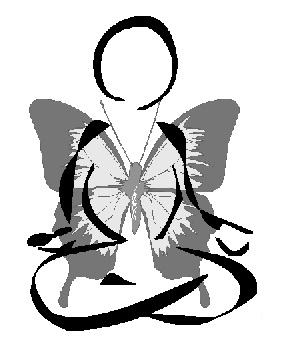 Many JETs and JET alumni find themselves at a crossroads regarding their careers and career options. Nicole D. Mignone (Akita-ken, 1991-1993), a certified life coach, will be periodically posting articles for the benefit of the JET Community. You can read more of her life-related articles at her blog thealchemyofbalance.blogspot.com. She also offers individual life and business coaching. For more information, email Nicole at drmuse@jetwit.com.
Many JETs and JET alumni find themselves at a crossroads regarding their careers and career options. Nicole D. Mignone (Akita-ken, 1991-1993), a certified life coach, will be periodically posting articles for the benefit of the JET Community. You can read more of her life-related articles at her blog thealchemyofbalance.blogspot.com. She also offers individual life and business coaching. For more information, email Nicole at drmuse@jetwit.com.
Dear Dr. Muse:
I feel conflicted about what I should do about my job and what the right career option is. J.D. in D.C.
Dear J.D.:
The word “should” always signals to me that some inner dialogue may be preventing you from doing or determining what you really want. The following exercise assists you with figuring out what you are tolerating in your life, why, and how to eliminate some situations that may be draining you. This may give you some free time to spend on more peaceful projects.
Day 1: Schedule about 15 distraction-free minutes with a pen and some paper. Take a few pieces of paper and fold them in half.
a/ On top of the lefthand colum of one piece of paper, write: I Should….
Then, set a timer for 5 minutes, and then write every and any thought that pops into your head answering that question. Do not think into the answer, just write the thought.
b/ On another piece of paper, on the top of the lefthand column write: I want…
Then, set a timer for 5 minutes, and then write every and any thought that pops into your head answering that question. Do not think into the answer, just write the thought.
c/ Now, repeat this exercise on another sheet of paper and write on the top of the lefthand column: I am Tolerating…..
Set these pages aside for another day to analyze.
Day 2 : The next part of this exercise will take some time to analyze your lists. For the “shoulds” list, over the next few weeks, you are going to evaluate three at a time on this list. Take some time to answer the following questions for each should:
*why is this a should?
*who says I should do this?
*what would happen if I did not do it?
*who would I be without this should on my list?
*what would I rather do instead?
On a blank piece of paper write out three restatements for your “Shoulds” that assert what you would rather have. For example, rather than ‘I should be a lawyer,’ you may decide to write, ‘I prefer work where I am creative,” or “I am an opera singer.” Write something that affirms what you want.
As for toleartions, do the same thing. Pick three on your list each week and ask yourself why you are tolerating this and what would your life look like if you did not tolerate it anymore. Then, on a separate piece of paper, rewrite the toleration to be something you do want.
Finally, the “I want” column is for you to keep in your journal or bookmark. Every few months, refer to this list to assess whether your wants have changed, or to inspire you on a course of action to take to get you closer to what you want. What you think you want today and what you start to create later may surprise you!
As you can see from these columns, career choices overlap with other areas of our life. By paying attention to our thoughts and our present life even outside of work, we can aseemble the bigger puzzle pieces of our life into a picture we enjoy.
Like hiring a personal trainer to reach your fitness goals, a personal life coach can assist you to attain your personal goals. You may write the Muse with any coaching questions, or inquiries into life coaching options on a one-time or ongoing basis at drmuse@jetwit.com.
Tom Baker reviews “The Hurt Locker”
Tom Baker (Chiba-ken, 1989-91) is a staff writer for The Daily Yomiuri. A big part of his beat is the Pop Culture page, which covers manga, anime and video games. You can follow Tom’s blog at tokyotombaker.wordpress.com.
He also writes about movies. Here is his review of “The Hurt Locker,” which just opened in Japan and has been nominated for several Academy Awards (the results of which will be revealed very soon):
“If I’m gonna die, I want to die comfortable,” U.S. Army Sgt. William James says as he shucks off his hot and bulky bomb-disposal suit. Then he bends over the open trunk of a car in an alley beside a freshly evacuated U.N. office building in Baghdad and begins to run his eyes and fingers over a tangle of wires connected to a large collection of bombs.
Why is he doing it?
In The Hurt Locker, a movie that has been nominated for nine Academy Awards, including best picture, “why” is just one of the implicit yet ever-present questions…
Read the rest of the review here.
Casting Call Auditions! Japanese Americans in Seattle
Casting Call for Japanese Mini-Series: In March, Japanese TV producers will hold auditions in Seattle for a couple of minor roles in a mini-series to be broadcast in Japan. Shooting is scheduled for May 16 in Seattle. The drama follows a Japanese American family from their immigration to the United States, through hardships during World War II, to their lives today.
Audition Dates: March 8 (Mon.) and March 9 (Tues.)
Union Status: This is a non-union job.
Shoot Date: May 16 (Sun.) in Seattle, subject to change
Role: Japanese American Boy
Age: 15-17
Skill: English speaking, conversational Japanese a plus
Role: Japanese American Girl
Age: 12-15
Skill: English speaking, conversational Japanese a plus
Please send your resume and headshots and indicate which date you are available to audition.
Email photos and information to jaminitv@gmail.com
Tom Baker writes about umami, food science
Tom Baker (Chiba-ken, 1989-91) is a staff writer for The Daily Yomiuri. A big part of his beat is the Pop Culture page, which covers manga, anime and video games. You can follow Tom’s blog at tokyotombaker.wordpress.com.
He also writes about food. Here is a recent article about a food science exhibition currently running at Tokyo’s Miraikan museum. The latter half of the story focuses in on the scientific-culinary concept of umami, often called the“fifth taste”:
How many calories are there in a 500-milliliter bottle of a zero-calorie soft drink? If you guessed zero, you might be right. But the correct answer could be as high as 24. This is one of the many fun facts visitors can learn at “It’s a Tasty World–Food Science Now,” an exhibition running through March 22 at the Miraikan science museum in Odaiba, Tokyo. Under Japanese law, according to a display debunking food myths at the show, a drink is “zero calorie” as long as it has less than five calories per 100 milliliters. (A note on vocabulary: A “calorie” and a “kilocalorie” are the same thing.)
Other displays include sniffable containers of food scents, which you can mix to create new aromas; videos of food processing factories, where plump onions comically pirouette on industrial peelers; and a glowing green tank of euglena, a photosynthetic microorganism seen as a promising future food source. Too bad its Japanese name, midori mushi–green bug–isn’t exactly appetizing….
Read the rest of the article here.

